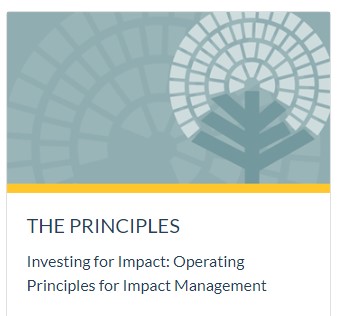Using IFC’s Operating Principles for Impact Management to your advantage
Forget the rubber stamp and turn it into a meaningful tool for advice
IFC’s Operating Principles for Impact Management are a great step towards transparent and accountable impact measurement. But fund managers fear that the independent verification requirement (Operating Principle 9) will cost a lot for little return. That’s true if you think of it as an old-fashioned audit. But there’s a great opportunity for affordable and valuable advice that forms the basis for continuous learning and improvement.
On April 12, the International Finance Corporation (IFC) launched the Operating Principles for Impact Management. The Principles provide a reference point against which the impact management systems of funds can be assessed. I like the nine Operating Principles. They’re concise, their language is simple, and they give a logical overview of the building blocks of impact management.
Fund managers have an important point of concern though and that’s Operating Principle 9. This principle states that a signatory shall ‘publicly disclose alignment with the Principles and provide regular independent verification of the alignment.’ The question is how ‘regular independent verification’ should be interpreted. A footnote in the document tells us that this can be done either as part of the financial audit or by means of a fund performance evaluation. Understandably, fund managers fear that setting up another audit process would cost them too much. Consider an accountant’s price tag for auditing a Sustainability Report and you know why.
And there are more important reasons why the verification doesn’t need to be done through an audit. First, because impact measurement is not exact science. An audit on impact figures cannot give the same level of comfort as a financial audit can. Second, it is not about an audit trail of the data collected. What we really want to understand are the assumptions, proxies and decisions a fund manager applies to come to its impact results.
I believe that a fund manager is better off with an evaluation or assessment. A good assessment goes further than tracing the impact results back to their sources because it also makes a judgement of achieved results. It enables the fund manager to reflect on its performance, serves as a starting point for dialogue with investors and helps determine measures for improvement in the future.
We see an increasing number of fund managers take this assessment approach. And at Steward Redqueen we help them with that. Some fund managers ask us to set up their internal assessment process and they take it from there. But there are others who take it further and who want us to do this. To these clients, we become partners. We set up the assessment framework and come back periodically to assess the impact results and provide advice for improvement. This way we provide the fund manager a strong impact assessment service. On top of that, we do this on a low cost/high value basis as the partnership is spread out over a fund’s lifetime.




















